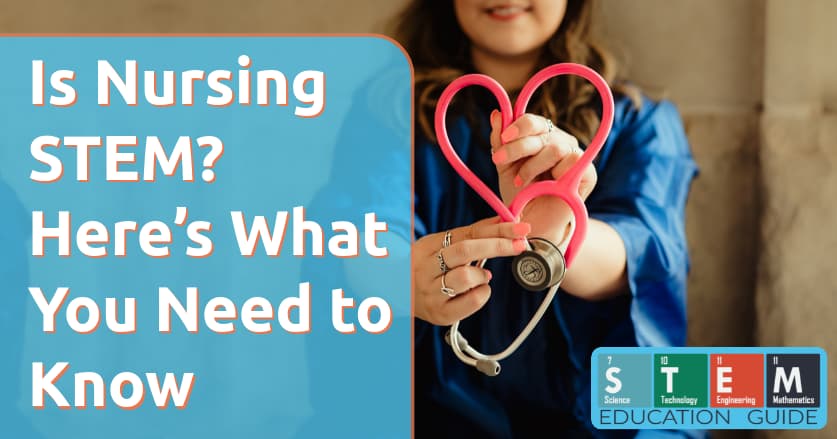One wouldn’t consider nursing a contentious issue when it comes to STEM education. However, surprisingly it is!
It seems obvious that nursing would clearly encapsulate STEM (Science, Technology, Engineering, and Math), yet even those who work in the field argue as to whether they are employed in a STEM field or not.
Message boards are flooded with prospective students, current students, and those in the profession questioning if nursing is categorized as STEM or not. Oddly enough, the answers are split.
Table of Contents
What Classifies a Profession as a STEM Occupation?

To answer whether nursing is a STEM occupation or not, we need to first understand the definition of what constitutes STEM. What classifies a job as STEM? What are the criteria? Why do some jobs make it into this category while some do not?
STEM began (edweek) as an initiative to promote innovation in fields that have to play a central role in generating new industries and employment. The goal was to maintain a dominant role in a globalized marketplace.
The goal was to provide funding to generate more jobs in this area. The issue, at the time, was slow job growth in these sectors after the recovery from the recession in 2008.
The government felt that it was a “skills gap,” which is defined as a belief that there are an adequate number of good-paying jobs (dailynurse) in a field. However, there aren’t people equipped educationally to fill them.
The challenge, they found, was determining what indeed should be considered a STEM occupation and what does not. Many jobs use components of STEM- Science, Technology, Education, and Math- yet, in a true sense, they are not truly a STEM job.
While this was a great initiative, the challenge is in standardizing what a STEM occupation entails.
As it stands, determining whether a job is STEM or not depends on the criteria (nature of work, education or degree, skills, type of worker, and education) and what categories (healthcare, production, etc.) should be included in the broad designation that encompasses STEM.
Since STEM is such a broad definition, the problem lies in its interpretation. Institutions and even government organizations/departments have their way of classifying a STEM occupation. So, while one may accept it as a STEM occupation, another, by their definition, may not.
This ends up creating confusion in various industries where their designation should be clearly defined by the nature of the job.
Furthermore, the amount of funding they receive to put towards education and training is lacking. These are often underfunded sectors where job demand is very high. However, the overall sector suffers due to staffing shortages due to a lack of funding.
This may be partly due to the definition of STEM. As you will read shortly, there are benefits of an occupation receiving a STEM designation. The most significant factor, of course, is monetary.
It should also be noted that even though a job, such as nursing, appears to be STEM, the focus tends to be more on the innovation side as opposed to the humanitarian considerations.
—–There’s a lot of debate on the sciences versus the arts and STEM vs humanities. Take a look at our article, STEM vs. Humanities: Personality Types Weigh In On an Age-Old Debate. As we take a deep dive into this discussion.—–
Is Nursing STEM?
While the National Science and Technology Council has devised a five-year plan beginning in 2013 to ensure the area of STEM experiences sustainable growth opportunities, the Federal Government still does not acknowledge it yet as STEM.
This astounds many in this field, as nursing is heavily based on science and math. A registered nurse must study the following components to even graduate:
- Chemistry
- Physics
- Biology
- Microbiology
- Anatomy
- Physiology
- Pharmacology
- Social/behavior sciences (sociology)
- Developmental psychology
- Psychology
In addition to the scientific portion of the job, nurses deal with technology and advances in this field daily. It is what their job encompasses. Mathematics is also part of the job (pharmacology aspect).
Yet, despite the overwhelming evidence that it should be classified as a STEM field, or at least one adjacent, it still is not. At least, not on a national level.
The Bureau of Labor Statistics includes nursing as a STEM field and as STEM-adjacent. The differences between why some departments classify nursing as STEM and others do not are primarily due to the nuances in the definition of STEM.
Why Isn’t Nursing Classified as STEM?

Some experts argue that the reason boils down to gender-based prejudice. Historically, the job was deemed a woman’s occupation, which focuses on caring and comfort instead of “hard” science.
Regrettably, antiquated thinking may have hampered the possibility for reclassification to STEM education.
Another reason for the delay is said to be due to capitalist undertones at the reason behind the movement.
At the heart of the STEM movement, the pursuits in this area are framed as necessary for economic growth. At the same time, this isn’t a bad thing. The ongoing pursuits of job creation, product development, and disruptions to industry costs fields that are more about human outcomes.
In short, it puts economic growth (money) ahead of the humanitarian side of the occupation.
—–We covered some of the women in STEM statistics here, but for a full view, take a look at our article about STEM statistics.—–
The Unfortunate Result
Acknowledgment of nursing as a STEM field would possibly create more available funding for nursing education and address shortages in this profession. It would also allow graduates to work both in the health care sector and within business/industry due to STEM knowledge.
—–Powerful learning doesn’t happen in isolation, which is particularly true for young learners. In our article, What Are STEM Ecosystems and How Are They Developed. We share what exactly are STEM ecosystems, and much more.—–
Why Is Recognition Important?
As mentioned, the one factor that makes it essential is addressing a gender-based bias. While nursing may have traditionally been aimed at women, the field has grown exponentially since then. Many excellent male nurses have entered the field, and this outdated bias is indeed discriminatory.
Furthermore, whether a profession is or is not dominated by a specific gender should not exclude them from being accepted as a STEM profession when by its very nature, it should be.
Excluding a profession that so obviously falls into a STEM, the category seems baffling.
STEM designations have a promise for professional respect within the industry. With it are higher salaries which make building a qualified workforce easier.
Money is additionally at stake. The government, scientific sectors, and development sectors are deeply invested in boosting STEM workplaces. Investments in grants, support resources, and scholarships are available promoting this industry.
In 2018, the U.S. Department of Education provided $279 million to a STEM discretionary grant fund. It focused on creating opportunities for underserved populations and women to enter the field. With ever-increasing nursing shortages, overworked nurses, shortages of nurses with advanced degrees, more money is needed.
Every community would benefit from having nursing included in STEM. Funds could then be allocated to a nursing program geared to train and recruit those needed to counter present-day shortages. Healthcare would improve, as would wait times for treatment since nurses are the backbone for medicine.
Should Nursing be Classified as STEM?

Many professionals worldwide would say absolutely! Hospitals are experiencing nursing staff shortages at higher than average levels. There is a clear need for qualified individuals in this field. Funding in this area may go a long way in fulfilling this need.
Nurses are being overworked and are stretched. When this lack of qualified individuals occurs, there is a large margin for error. Tired people are not able to adequately focus on quality care. Furthermore, no one receiving care should have a registered nurse who is burned out. It can be detrimental health-wise.
These shortages have caused the industry to suffer. Wait times are long, emergency rooms are packed, and our healthcare system is backed up. Funding for additional people would be quite handy right now.
However, due to the ambiguity in the STEM labeling, funds that could be allocated to nursing may be scant.
As mentioned, there was a government initiative to increase funding in education and training in these areas. However, since nursing is not classified as a STEM profession, they would be excluded from receiving any form of a federal grant.
Are the reasons for not reclassifying nursing based on a faulty gender perception? This is difficult to qualify. There may be an emphasis that is placed heavily on innovation. If the emphasis is truly on increasing innovation, then it makes sense that funds would be delivered differently.
Advances in innovation make any country wealthy. It enables them to be highly competitive on an international stage. It makes sense to want to emphasize this area.
However, it is more economically advantageous than nationally advantageous. While the economy may receive a boost and thus create more jobs, if these jobs can’t be filled with people due to a lacking health care system, we are all in trouble. The problem is the focus- money- over the compassion side of things.
The definition of STEM overall needs to be more clearly defined to remove ambiguity from the situation. There needs to be more of a balance in terms of funding to reflect what is going on in the nation overall and what the needs truly are.
We can only do this if we completely understand the terms involved.
—–Is Economics STEM? In our article here, we take a hard look Why Colleges Want Economics to Be a STEM Major.—–









The question you didn’t answer than how does this change? What is a solution to nursing becoming a recognized STEM major?
Hi Krystal, Arthur here, just read your article. Exactly what Elizabeth’s family needs to hear! I shared this with them. Now, on to the ebook.
Thank you,
Arthur
Hi Arthur, I’m glad this article helped; feel free to share my ebook too!
I am presenting nursing at a STEM conference for middle school children. We are making progress!
Dr. Terri Cronbaugh
Great news, Dr. Cronbaugh! You dared to STEM, so can they!
Arthur Butler, STEM enthusiast & poet